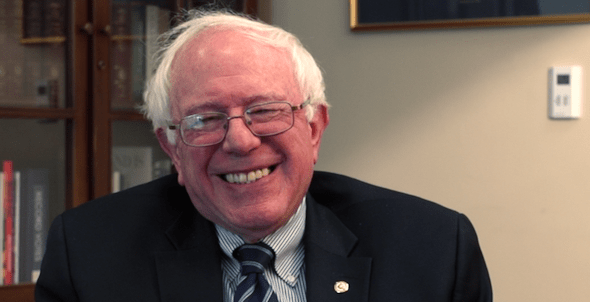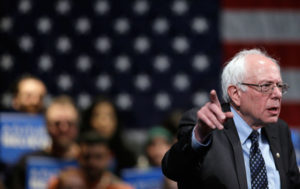Truthdigger of the Week: Sen. Bernie Sanders (Video)
In a Truthdig exclusive, the Vermont senator and avowed socialist discusses why the super-rich should support an amendment mandating the public funding of elections.
Every week the Truthdig editorial staff selects a Truthdigger of the Week, a group or person worthy of recognition for speaking truth to power, breaking the story or blowing the whistle. It is not a lifetime achievement award. Rather, we’re looking for newsmakers whose actions in a given week are worth celebrating.
During the five days I spent in Washington D.C. last week, I couldn’t help but notice the similarities to Disneyland. The performers smile as they work. The grounds that enclose the attractions are impeccably maintained right up to their perimeter and no farther, and if you hang around a congressional office building long enough, you’re bound to run into a celebrity.
A Gallup poll taken in late 2013 showed 70 percent of Americans lack faith in their government’s ability to tackle the problems that the country would be facing in 2014. Why shouldn’t they? Neither the Obama administration nor the 113th Congress have restored the better-paying jobs lost in the bankster-fueled crisis, nor have they reversed industry’s assault on the environment or come to the rescue of homeowners and students whose chances of materially improving their lives lie motionless at the bottom of a pool of debt. To the contrary, the Supreme Court busied itself codifying discrimination against minority voters while another branch of government steadily collected billions of Americans’ email messages and telephone calls. As concerns the bulk of the population, the sphere of obligation honored by the government as a whole seems to shrink with each passing year.
Still, the promises of American democracy have not been irreversibly reneged. It would be remiss to write off all teachers, doctors and priests for the failings common to their vocations. So to would it be dishonest to dismiss all politicians as bought protectors of a corporate state. Contrary to the lament of Claudius in historian Robert Graves’ telling of the reign of the Caesars, there may still be lions left in American Rome. I’d traveled to the Capitol to see.
Bernie Sanders is the U.S. Senate’s only outspoken socialist. He has served the state of Vermont in Congress for more than 20 years and the town of Burlington as mayor for four terms. He ran undefeated for every office he sought thereafter. His politics correspond to those of the labor movement before Roosevelt’s New Deal rescued a suicidal capitalism and find their contemporary correlation in northern Europe’s social democracies. He says workers have the right to participate in the management of their companies because, as Abraham Lincoln understood and expressed, all wealth originates with labor.
While societies that regulate capitalism least produce the richest people on earth, the massive deregulation that tends to accompany them confirms that they also generate the greatest percentages of people who live miserably. And it’s not just vast numbers of individuals who suffer. Unknown numbers of the yet-born stand to miss out on the paradise that could have been if a small portion of their forebears had not cooperated with narrow self-interest.
Social democracies of the kind Sanders might help make of America if he had the necessary support are more humane and sensible than the alternatives. And because they allow for a limited practice of capitalism, they are presently more practical as an objective for Americans hoping to rescue their country and others from a spreading and intensifying hell.
Sen. Sanders and I spent 20 minutes discussing the private funding of political careers. He was visibly preoccupied when he entered the conference room that adjoins his office. He is Chairman of the Senate Committee on Veterans’ Affairs, and a bill that would provide needed financial and other assistance to combat veterans — a bill he authored — was less than 24 hours away from a vote on the Senate floor. His voice was suffused with tones of resignation common to people who carry into late life a determination that first drove their efforts in youth.
A video excerpt and transcript of our exchange edited for clarity and flow follows. For the commitment to the wellbeing of all his fellow Americans expressed therein, we honor Sen. Bernie Sanders as our Truthdigger of the Week.
***
Video produced by Blair Kelly and Tylor Bohlman
Alexander Reed Kelly
: Senator Sanders, I begin from the perspective that nothing lasting can be achieved in a progressive direction in politics — whether it’s war, climate change or economic exploitation — until the corrupting influence of private money is removed from all aspects of governance. Is this view generally correct?
Sen. Bernie Sanders: I think so. I think people do not fully appreciate the degree to which big money, campaign contributions and lobbying and PACs and corporate media play in whether or not serious legislation is discussed and passed. Despite the fact that we have a collapsing middle class, more people living in poverty than at any time during our history, and the gap between the very, very rich and everyone else growing wider, it is very hard for me to imagine significant legislation being passed that Wall Street and the big money interests don’t want.
Kelly: If this is the case, how have you remained in office?
Sanders: That’s a good question. I think my political life is a little bit different than most of my colleagues. I’m not a Democrat. I’m not a Republican. I’m the longest-serving independent in the history of the United States Congress. And in terms of how I raise money I do it differently I think than every other member. We raise money from tens, and tens, and tens of thousands of people in Vermont and all over this country. I believe our average contribution is $50, if my memory is correct. We do not take corporate PACs. We do take PAC money from unions, environmental groups, women’s groups and so forth. But the bulk of my money comes from middle-class, working-class people who are coming up with 20 bucks, 30 bucks.Kelly: And that’s enough to sustain you?
Sanders: It is. It is.
Kelly: You win by large margins.
Sanders: I did win by 71 percent of the vote last time and 67 percent of the vote six years before that running against the wealthiest guy in the state of Vermont who spent more money on his campaign than anyone’s ever spent.
Kelly: How much time do you spend fundraising as a portion of the time you spend working in Congress?
Sanders: I spend much, much less than a lot of people. I’m not going to tell you I don’t spend any time. Most of our money comes from our website and every now and then I write kind of a long three or four page letter, raising money and we get some money. But I will tell you I do spend time. But I don’t think anywhere near as much as the average person in the Senate and the House does. And that is, I think if people knew how much, not only time, but mental energy — you know, we’re all human beings, and if your goal is to raise X amounts of money in a week, if you think you can cut that switch, turn that switch off and say, “Oh, now I have to deal with unemployment or health care or education,” you can’t do that. People are obsessed by the need to raise huge amounts of money and it impacts their legislative work absolutely and positively. Not to mention the simple large amount of hours that people spend doing that.
Kelly: Do any of your colleagues love this?
Sanders: No. I think it’s probably fair to say that for many Republicans as well, this is pretty much across the board. Who would possibly like getting on the phone, calling up people who you have never met in your life and begging for money? I don’t think anybody likes that at all, and I think people feel that that is not why — you know, regardless of their political views — I think that many people feel that’s not why I got into politics, to sit around and spend an inordinate amount of time raising money from rich people I’ve never met in my life.
Kelly: You must hear complaints about this.
Sanders: Oh, god yes.
Kelly: What do your colleagues say?
Sanders: Well, people are saying, you know, this is absurd. I came here to do serious work and not spending my life raising money. And what’s happening is because of this disastrous Supreme Court decision of Citizens United, a bad situation — and it’s been bad for a while — has become much worse. Because with the Citizens United decision, the big money interests are now able to spend $10 million against your campaign, which means you have got to raise even more money, and you probably have to raise that money from wealthy people who don’t have the views that, say, some of the Democrats have.
Kelly: So why don’t legislators band together and put an end to this?
Sanders: Well, that’s a very good question. The answer is that while on a personal level I think you have a number of Republicans who do not like raising money and some of them have spoken out, the truth of the matter is that they understand it ultimately works for them politically. So you may find it distasteful, but if at the end of the day you have the Koch brothers prepared to spend huge amounts of money in support of you or in opposition to your opponent, it works for you.
Kelly: Because the Kochs and their friends are spending so much money to game the system, it’s inconceivable that Congress would solve this problem on its own. It seems to me and to a lot of people I talk to that what we need is a nationwide grass-roots movement of the size and imagination of the civil rights era. But so many Americans are turned off by anything that resembles politics as they’ve come to understand it.
Sanders: Precisely. It’s a Catch-22. The worse the situation becomes, the more disillusioned people become. The more disillusioned people become, the less they’re gonna be active.
Let me tell you some good news. A few weeks ago I was asked to get on the phone and talk to college students all over the country. I was told there were a hundred campuses on the phone. I don’t know that that’s accurate. And you know what the issue was? To my surprise, it wasn’t climate change. It wasn’t women’s rights. It wasn’t gay rights. It wasn’t economics. It wasn’t college affordability. It in fact was campaign finance. So there are a lot of folks, including young people, who do understand that no matter what issue you are concerned about, whether it’s the economy, whether it is income and wealth disparity, climate change, women’s rights, gay rights, whatever it may be, at the end of the day, we are not gonna succeed in a progressive way unless we have real campaign finance reform. And I think a lot of people understand that.
Now the good news is that there is already somewhat of a grass-roots movement. I know Public Citizen and other groups are working hard. I believe that some 500 cities around the country have come on board, voted to support a constitutional amendment to overturn Citizens United. I think it’s 17 or 18 states, including my state of Vermont, that have also done the same. So we are beginning to see a grass-roots movement. We’ve gotta go a lot further and a lot more aggressively.
Kelly: A lot more aggressively.
Sanders: Look, the truth is, this nation is rapidly moving toward an oligarchic society. Do you know what that means?
Kelly: Yes, but tell us please.
Sanders: What that means is that we are going to be living in a country in which a handful of billionaire families control not only the economic life of the country, but the political life of the country, because they have unlimited, literally unlimited amounts of money to spend on the political process. These are the guys who will set up all these think tanks. They’ll endow seats in various colleges and universities, not to mention pouring hundreds of millions of dollars into campaigns. That’s where we are right now. And if we don’t get our act together and I think do two things — short term, we have to pass a constitutional amendment to overturn Citizens United. Longer term, but equally more important, we need public funding of elections. So if you’re serious about democracy, one person one vote, ideas prevailing, rather than money prevailing, you’re gonna need public funding of elections.
Kelly: This is not a left or right issue.
Sanders: It is not a left or right issue. If you go to some honest conservatives, they will tell you, look, this is not what America is supposed to be about. A handful of billionaires should not control the political process.
When you talk about politics in America you’ve got the Democratic Party and the Republican Party. Well let me tell you, you’ve now got a third party, which might be far more influential than either the Democrats or the Republicans, and that’s the Koch brothers’ party and their allies. It is quite possible that now, either in the immediate future or the not too distant future, they will have more political influence than parties in which millions of people are active in. That’s the direction we are heading.Kelly: If I had a hundred billon dollars, why should I invest in a movement solely for publicly financed elections?
Sanders: If you had a hundred billion dollars?
Kelly: If I was rich like the Koch brothers, yeah.
Sanders: Because, you understand that greed is not the end-all in life. You understand that if you’re the Koch brothers with $75 billion, that’s kind of enough to get by. You really don’t need more. You don’t need more tax breaks. You don’t need to continue your war against working Americans. So if you were a wealthy person, and you love this country and you are proud of the fact that this country has led the world in many respects — not to mention the many problems we’ve had, we all know them — but we have been a democratic force for good in many respects around the world, and if you believe in the virtues of democracy, and the desire to see people participate in the political process, and young people getting excited about living in a democracy, then you want to play an important role in helping us defeat Citizens United and move to public funding.
Kelly: The people who have this much money, do they believe this?
Sanders: A few do. Most don’t. I mean, really, above and beyond campaign finance, one of the really sick elements, aspects of the world we live in today is some of these billionaires are like alcoholics or heroin addicts who need another fix. I mean, it is, literally — I mean this sincerely — I grew up in a family that never had any money, but it is hard for me to understand how someone who is worth a billion dollars just needs that next billion, and needs to fight so hard to break unions, or not increase the minimum wage. I mean, if you have a billion dollars, really, why do you have to stay up nights worrying about your next billion —
Kelly: Well, the fear is that if they give a little then they’re going to give a lot later on. The dam is going to break, and everyone in this society is afraid of becoming impoverished.
Sanders: Well, you know what, if you’ve got a billion, you can give a little.
Kelly: Yeah, but there’s this irrational fear that takes over, right?
Sanders: No, I don’t think so.
Kelly: I’m not defending this view. I’m just —
Sanders: I know. I don’t think so. I think there are a couple of factors. And I’m not a psychologist, because this is really — you should look at the issue of greed in the top 1 percent like a psychologist would look at heroin addiction, or alcoholism, and that is the need to have more and more and more in an uncontrollable way. You can’t control yourself. And I think it has No. 1 to do with a power trip. To be honest with you, power’s a pretty good thing. If you were worth a few billion dollars, you could sit down there with your brother and say, you know what? We’re gonna elect that governor. We’re gonna elect that senator. You know what? We’ve got a shot to elect the president of the United States. Hey, mom would feel pretty good about this, just a couple of us sitting here around the kitchen table. So power is a huge, I think, incentive, for these guys. It’s not just more money; it’s the power that goes with that money.
Now, do you want a happy story in the midst of difficult times? Three or four years ago virtually every Republican in the United States Congress wanted to cut Social Security and privatize Social Security. Sadly a number of Democrats joined them, including the president of the United States who supported a so-called Chained CPI. You had Pete Peterson, do you know who Pete Peterson is? He’s not quite the Koch brothers. He’s only worth a couple billion dollars. But he has spent hundreds of millions of dollars to cut Social Security. We ended up defeating all of that. Now how did we defeat it? The president just came out and said he’s not gonna put cuts in Social Security into his budget. How did we end up doing that? We did that because we rallied the American people.
So here’s the good news. If you educate and you organize, the truth of the matter is that the vast majority of the American people believe in an economy which works for everybody, not just the few; they do not believe that billionaires should control the political process. They do not believe we should cut Social Security and Medicare. They are concerned about climate change, etc., etc. So our job is to understand that we have a lot of people behind us, including some of them who define themselves as conservative. How do you bring them together? How do you organize them? How do you get their input into the political process? That’s the goal that we have.
Your support matters…Independent journalism is under threat and overshadowed by heavily funded mainstream media.
You can help level the playing field. Become a member.
Your tax-deductible contribution keeps us digging beneath the headlines to give you thought-provoking, investigative reporting and analysis that unearths what's really happening- without compromise.
Give today to support our courageous, independent journalists.





